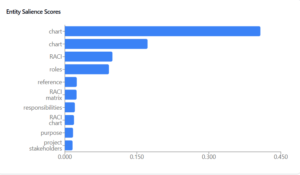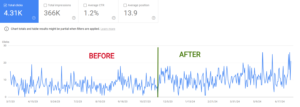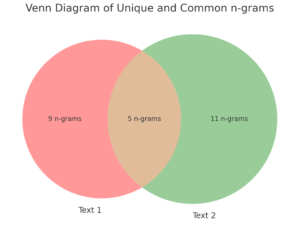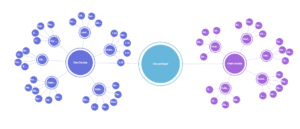This app finds semantically related keywords that you can use to optimize your pages.
Enter a list of a couple of primary keywords (or target queries) and the app will do the following:
- Expand the list to find related keywords.
- Find the search volume and competition level of the keywords.
- Output a table of semantically related words with search volume and competition score.
Try it here: Semantic Keyword Finder App
Benefits of the Semantic Keyword Finder app
I frequently look for keywords on the fly when optimizing pages. I turn to tools like Ahrefs keyword research.
However, all keyword tools do a terrible job of finding semantically related keywords.
Sure you’ll find the primary keywords and main variations, but what about all those related words?
Those related words are more important than ever as Google’s algorithms increasingly focus on context instead of keywords.
And it can be hard to think of them without being an expert in the particular industry or niche you’re working in.
Do you know anything about epigenetics?
For example, say you’re working on optimizing a page about epigenetics and you know nothing about the subject.
Your brain will do a bad job of knowing the related words to include on your page. But AI won’t!
That’s where this semantic keyword-finding tool comes in handy.
It will find those word variations you wouldn’t think of. Quickly. And it will pull in the search volume and competitiveness as a bonus
What are semantically related words and why do they matter for SEO?
Semantically related words are words or phrases that are related in meaning within a particular context. In the realm of search engine optimization, they are crucial because they help search engines understand the context and relevance of the content on a webpage. Context is more important than ever as search engines adapt and get smarter.
Semantically related words = lexical relations:
A well-known type of related keyword is a synonym. Most people know about synonyms from school. But did you know there are lots of other types of nyms? These are called lexical relations. Here’s a list of the different types of lexical relations with an example context of crypto mining:
- Holonym: A word that denotes a whole of which a part is described by another word. For instance, “Blockchain” is a holonym for “mining.”
- Meronym: This represents a part of something larger. For example, “GPUs” are a meronym for the larger concept of “mining.”
- Hypernym: A general category into which more specific words fall; like “Technology” is a hypernym for “mining.”
- Hyponym: A more specific term within a broader category. An example is “ASICs,” which are a specific type of technology used in “mining.”
- Synonym: Words that have similar meanings. “Graphics cards” and “GPUs for cryptocurrency mining” are synonyms in the context of mining technology.
- Antonym: Words with opposite meanings. “GPUs for gaming” vs. “GPUs for mining” show opposite applications of the same technology.
- Polyseme: A word with multiple related meanings. “Mining” can refer to both the extraction of minerals and the process of cryptocurrency generation.
- Homonym: Words that are spelled the same or sound the same but have different meanings. For example, “mining” in the context of extracting minerals versus in the context of cryptocurrency.
- Metonyms: A word that is used as a substitute for something else with which it is closely associated. “Hashrate” is often used metonymically for mining power in cryptocurrency.
- Homophones: Words that sound the same but have different meanings and usually different spellings. “Miners” (people who mine) and “Minors” (underage individuals) are homophones.
- Homographs: Words that are spelled the same but have different meanings and may have different pronunciations. “Mint” (to create currency) and “Mint” (a tasty candy) are examples of homographs.
- Eponyms: A word that is derived from a proper noun, like a person’s name. “Nakamoto” is an eponym referring to the pseudonymous creator of Bitcoin.
- Retronyms: A term coined for an old object or concept to differentiate it from a newer version. “Traditional mining” distinguishes it from modern, digital forms of mining.
- Contronyms: Words that can have opposite or contradictory meanings depending on the context. “Mine” can mean to extract or to dig a hole, showing contrasting actions.
- Capitonyms: Words that change their meaning (and sometimes pronunciation) when capitalized. “Mining” as an activity vs. “Mining” as a location or name.
But we’re here to rank!
You get the idea. Related words are important, but we aren’t here to learn linguistics. We’re here to rank pages! And that’s where AI comes in handy. Let’s give the boring work of finding lexical relations to a superpowered AI, and skip to the fun part where we optimize our pages with semantically related words.
Does keyword optimization still matter?
Yes. People who are going around and saying “keywords don’t matter anymore” are likely not actively doing any kind of keyword optimization. They probably have no idea if it still works and they don’t know better. They are probably parroting things they heard from a guru on LinkedIn.
For example, I recently “keyword optimized” this page with semantically related words. It recently got hit by an algorithm update, and optimizing it helped bring the page’s average position and traffic back up.
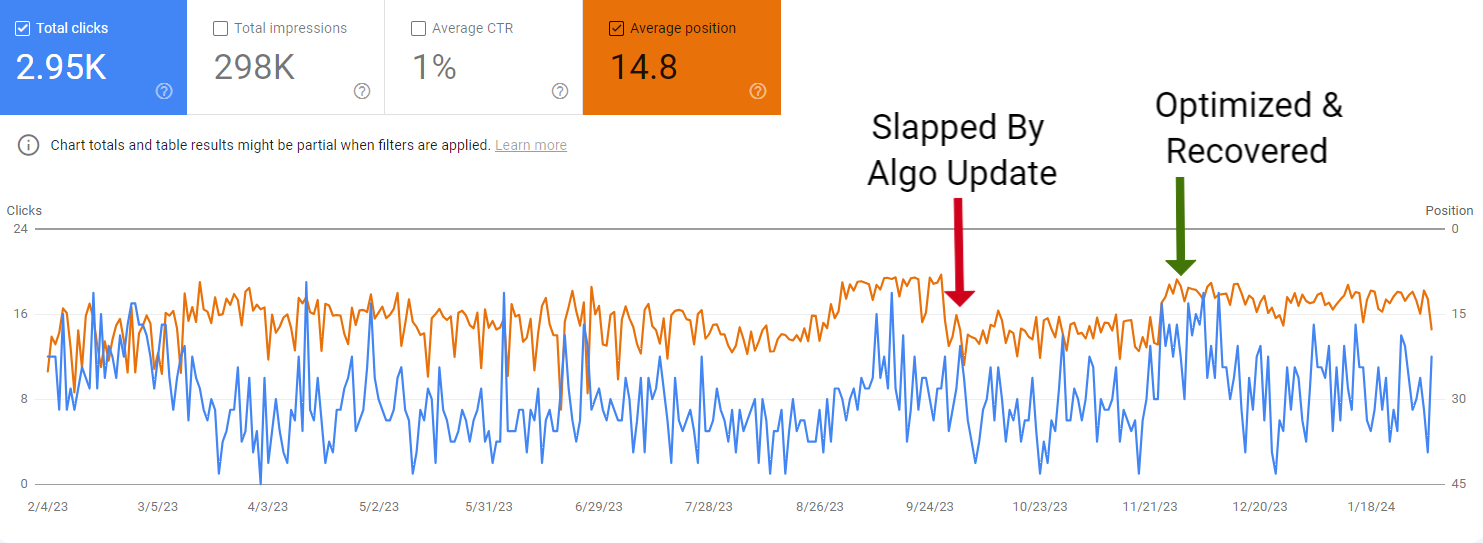
The end of keyword counting
Google and friends have come a long way. Adding keywords with a specific usage count used to be essential to ranking. Today, you only need a few keywords for Google to figure out what your page is about. However, there is a key element that still matters.
Related words.
See, search engines will auto-find related words and test your pages against them. That’s why if you check Google Search Console queries for a page, you’ll find that users found your pages with specific queries that you do not mention on your page.
However, if you have a diverse mix of related words on your page, it’s much easier for search engines to understand the context, and it will match more relevant queries faster. This results in pages being indexed for more queries in shorter time frames.
Using related words benefits SEO
Using related words increases the total amount of keywords a page will rank for. It can improve rankings and traffic when done correctly.
It’s also important to note that I’m not talking about keyword stuffing here. I’m talking about strategically sprinkling more high-value “nyms” into your text.
You don’t want to go overboard.
How to use the semantic keyword finder
The use case here is to grab a page that you want to optimize, figure out the top queries you want it to rank for, and then optimize using semantically related words.
Here’s a step-by-step process:
- Go to Google Search Console – Performance Tab
- Filter the page you are optimizing
- Grab high-impression queries you’d like to get more traffic from
- Put those queries into a comma-separated list in the app and run it
- Generate semantically related words and download the CSV
- Pull up your CSV, optimize your page, and highlight words used as you go.
- Enjoy a page that is now better optimized for contextual relevance.
Example output of the Semantic Keyword Finder app
Here’s an output for the target query “GPUs for mining cryptocurrency”.
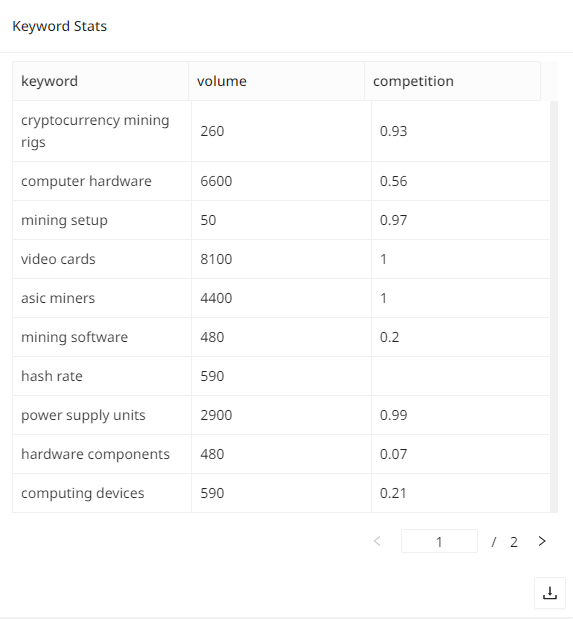
It found words like cryptocurrency mining rigs, hash rate, altcoin mining hardware, Nvidia mining cards, and more.
If you knew nothing about crypto mining, you probably wouldn’t have thought of these words. And you could have easily missed them in Ahrefs or Google Keyword Planner.
However, all of those words are highly related to GPUs for crypto mining. Semantic SEO is cool.
Build your own AI-powered SEO apps
This is a simple app, and you could easily build it out further into a more robust solution.
It runs on Moonlit, a no-code AI builder. If you’re interested in building apps like this one, join my AI SEO Academy.
I’ll show you how to make this app and many more. You’ll then be able to level up your SEO skills, automate boring stuff, and spend more time doing the things that matter.
